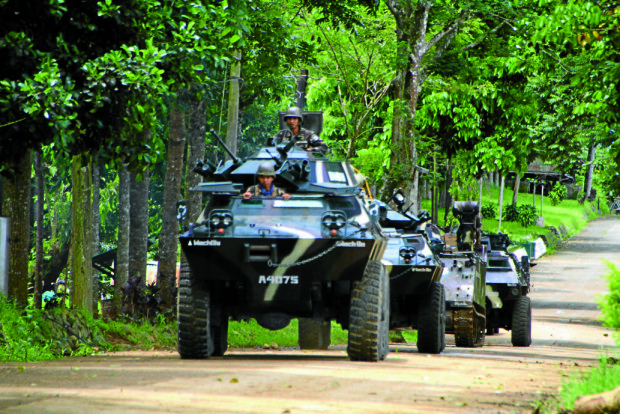Gov’t troops launch ‘precision attacks’ in Marawi

Troop movement in armored tanks moving out of 103rd Army’s Brigade Kampo ranao in Marawi City to provide fore power support of the ongoing firefight between the military and the suspected Islamic State and Maute group. (Photo RICHEL V. UMEL / Inquirer Mindanao)
MARAWI, Lanao del Sur — Government forces launched “precision attacks” Thursday to clear militants linked to the Islamic State group from Marawi City, which has been under siege since a raid to capture a militant on the US list of most-wanted terrorists failed.
Since late Tuesday, militants have torn through the streets of Marawi, torching buildings, taking a priest and his worshippers hostage and sealing off much of the city. The violence sent thousands of people fleeing and raised fears of extremists gaining traction in the country.
Around 20 people have died in the fighting, including 13 militants and five soldiers, said Lt. Col. Jo-ar Herrera, a military spokesman.
President Rodrigo Duterte said a local police chief was stopped at a militant checkpoint and beheaded.
It was not immediately clear whether civilians were among the dead.
Article continues after this advertisement“At night we can hear the gunfire,” said Mohammad Usman, who was among thousands of residents streaming out of the city Thursday, their belongings jammed into cars. He said he had spent the last few nights “praying that the bullets will not find their way to my house and hit us.”
Article continues after this advertisementDuterte imposed 60 days of martial law Tuesday on the island of Mindanao, which encompasses the southern third of the nation and is home to 22 million people. Marawi has a population of around 200,000.
Duterte warned he might expand martial law nationwide, an unnerving development for many in the Philippines who remember the rule of longtime dictator Ferdinand Marcos. Marcos declared martial law in 1972 and used it to maintain his grip on power for more than a decade.
The man at the center of the Marawi violence is Isnilon Hapilon. Washington has placed him on its list of most-wanted terrorists and offered a $5 million reward for information leading to his capture. The army raided what it believed to be his hideout on Tuesday night, but the operation quickly went wrong. Militants called in reinforcements and quickly overpowered the authorities.
“Based on reports, he is still in the city,” Herrara told reporters in Marawi as gunfire crackled in the background.
Hapilon, an Arabic-speaking Islamic preacher known for his expertise in commando assaults, is a commander of the Abu Sayyaf militant group. He pledged allegiance to the Islamic State group in 2014. This week’s raid was not the first time the military went after him – he was wounded by an airstrike in January.
Much of Marawi, which is in Lanao del Sur province, was still a no-go zone Thursday. Automatic gunfire and explosions could be heard clearly and plumes of black smoke rose from the direction of the city center. Air force helicopters swooped overhead.
“Attack helicopters fired rockets in a precision attack,” Herrera said. “We want to finish this problem as soon as possible.”
As authorities try to gain more control over the city, disturbing details have emerged.
Militants forced their way into the Marawi Cathedral and seized a Catholic priest, 10 worshippers and three church workers, according to the city’s bishop, Edwin de la Peña. The black flags of the Islamic State group were planted atop buildings and flown from commandeered vehicles, including a government ambulance and an armored car, said Lanao del Sur Gov. Mamintal Alonto Adiong Jr.
More than half of the population of Marawi has cleared out, Adiong said.
The problem of militancy in the south, the scene of decades-long Muslim separatist uprisings in the predominantly Catholic nation, is not new.
Besides the Abu Sayyaf, another, smaller militant group – the Maute – is heavily involved in the Marawi siege. The Maute is one of around a dozen new armed Muslim groups that have pledged allegiance to the Islamic State and formed a loose alliance, with Hapilon reportedly designated as the alliance’s leader.
The group has been blamed for a bombing that killed 15 people in southern Davao city, Duterte’s hometown, last September and a number of attacks on government forces in Lanao, although it has faced setbacks from a series of military offensives.
Last month, troops backed by airstrikes killed dozens of Maute militants and captured their jungle camp near Lanao del Sur’s Piagapo town. Troops found homemade bombs, grenades, combat uniforms and passports of suspected Indonesian militants in the camp, the military said.
Duterte has repeatedly threatened to place the region under martial law, which allows him to use the armed forces to carry out arrest, searches and detentions more rapidly. But human rights groups and others fear that martial law powers could further embolden the president, who already has been accused of allowing extrajudicial killings of thousands of people in his crackdown on illegal drugs.
RELATED VIDEO